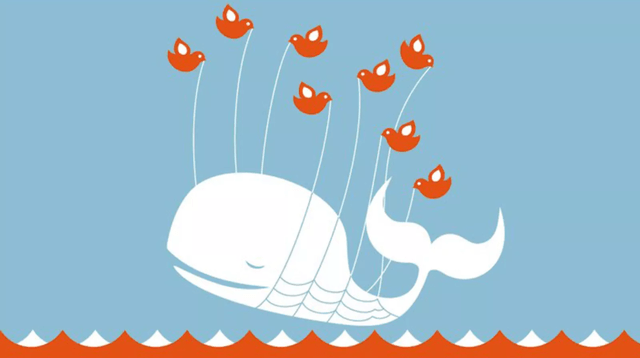
The “Fail Whale” Twitter displayed in its early years during service interruptions.
Twitter’s (TWTR) founders accidentally created an addictive platform which now has more than 150 million daily users. No competitor threatens Twitter’s niche of breaking news and pithy commentary. The only foreseeable threat for years has been government intervention, and Twitter may have finally asked for it by censoring a newspaper article weeks before the election. Let’s see why, and then look at how shareholders who are still bullish can limit their risk.
Background: A Potential Goldmine
As we noted four years ago, Twitter is a potential goldmine. For those who don’t use Twitter, Jon Hendren summarized its appeal:
Gone are the days of refreshing CNN.com or whatever during current events. It’s faster and easier to find the journalist closest to today’s disaster and watch their Twitter feed instead. And while that journalist will certainly have a published article up within the next 15 or 20 minutes at their day job, their tweets on the subject have probably already been retweeted a few thousand times and seen by a couple million people. And if you believe the typical information addict is going to go back to refreshing individual blogs and news sites, that’s ridiculous. […]
The Fav-and-RT-based serotonin reward system unintentionally built into Twitter also has the side effect of forcing introverts to obsessively write pithy jokes for huge audiences for free, day in and day out. Free funny content! Sometimes by actual comedians you’ve heard of! And some of those times, from good comedians! Users don’t even have to do anything special to gain access to that, they just open Twitter and read it. Free content shoots out like a fire hose.
On top of that, Twitter emerged as a platform for organic commerce: users sell each other tickets, make bets with each other, recommend all sorts of products to their followers. All Twitter had to do was to facilitate that commerce. Instead, it has incurred the wrath of Republican politicians by censoring a New York Post article critical of Hunter Biden.
Censoring The New York Post
On Wednesday, Twitter users were blocked from sharing the New York Post’s exposé of Hunter Biden’s emails.
Twitter’s stated rationale for its censorship was that the Post’s article included information it obtained without authorization.
Twitter users replied that Twitter didn’t similarly censure other news articles based on unauthorized information, such as the recent New York Times article on President Trump’s tax returns. Some users pointed out that, according to the Post’s article, they obtained Hunter Biden’s emails legally (reportedly, Biden left the laptop with a repair shop; after he didn’t return to pay for the repair or pick up the laptop, it became the shop owner’s legal property). Other users argued that the biggest scoops in journalism of the last fifty years relied on illegally obtained information, such as the Pentagon Papers.
Republican Reactions
Republican politicians such as Senator Josh Hawley of Missouri threatened to take action against Twitter.
President Trump called for repealing the FCC’s Section 230, the regulation that enables Twitter to avoid the potential liabilities associated with being a publisher.
All Bark And No Bite?
Observers on both ends of the political spectrum were quick to note that during the first two years of President Trump’s term, Republicans controlled both Houses of Congress and did nothing to restrict social media companies. For example, this was the reaction of the liberal opponent of monopolies, Matt Stoller.
And this was conservative pundit Pedro Gonzalez’s response to an angry tweet by Senator Tom Cotton:
In Case Their Bite Is Worse Than Their Bark This Time
In case the Republicans’ bite is worse than their bark this time, and they materially impact Twitter, below are a couple of ways Twitter shareholders can stay long while strictly limiting their risk. Here, we scan for optimal, or least-expensive, hedges using put options and collars to protect a Twitter position.
In the video above, we limited our search to hedges expiring in March, but readers can experiment with different time frames as well.

